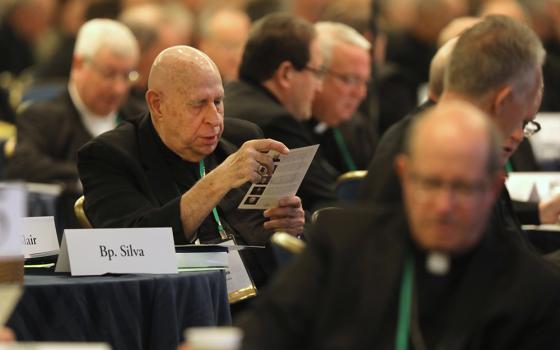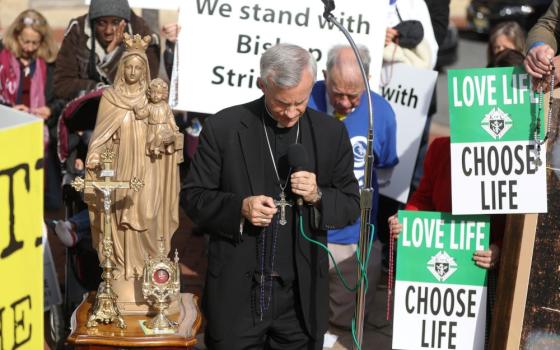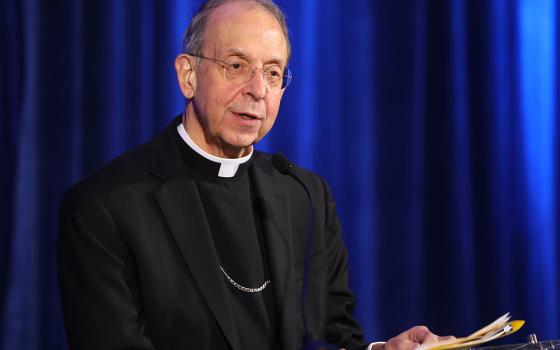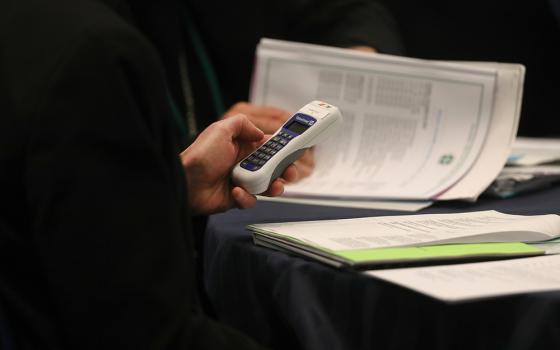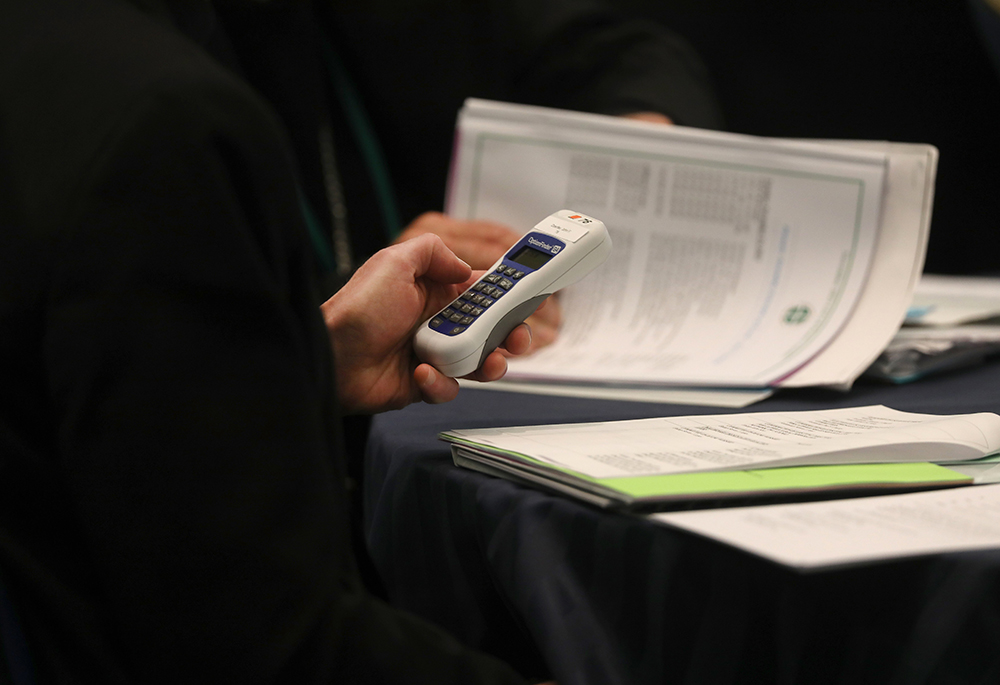
A bishop uses an electronic voting device during a Nov. 14, 2023, session of the fall general assembly of the U.S. Conference of Catholic Bishops in Baltimore. (OSV News/Bob Roller)
The elections for committee chairs and secretary of the U.S. Conference of Catholic Bishops were completed on Nov. 14 and the results were mixed. The bishops rejected some of the more extreme nominees, but also denied election to two of the bishops most prominently and vocally supportive of the direction in which Pope Francis wants to lead the church.
The election for chair-elect of the Committee on Communications was won by Bishop William Byrne of Springfield, Massachusetts, who defeated Coadjutor Archbishop Christopher Coyne of Hartford, Connecticut, by a vote of 142 to 103. One bishop told me before the vote that he thought Coyne would lose: "He was just appointed to a prominent archdiocese, a mark of papal favor," the bishop said. "That may be enough to get some of the guys to vote against him."
I suspect there was another factor at play. Byrne is not only an alumnus of the Pontifical North American College, he also taught homiletics there for many years. He is very close with Bishop James Checchio of Metuchen, New Jersey, who was rector at the college, and Bishop Austin Vetter of Helena, Montana, who was director of spiritual formation there. Coyne did graduate work in Rome, but did his seminary studies at St. John's Seminary in Boston. Time at the college places one in a network that extends throughout every region of the country. Byrne tapped into that.
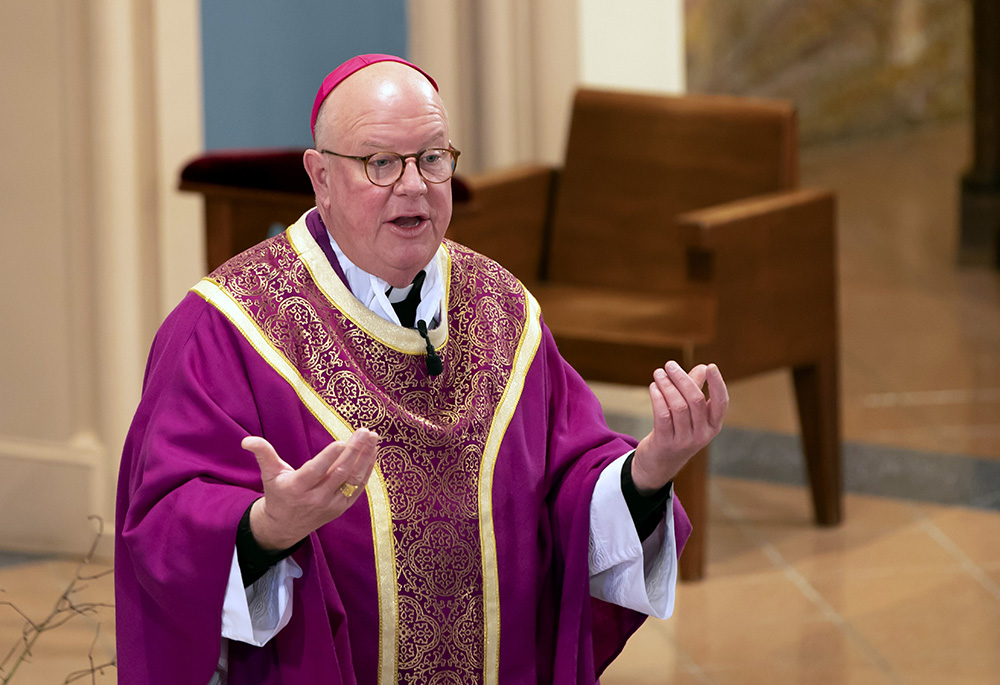
Bishop William Byrne of Springfield, Massachusetts, delivers his homily during Ash Wednesday Mass Feb. 17, 2021, at St. Michael's Cathedral. (CNS/Mary Jeanne Tash via Diocese of Springfield)
Bishop Robert Brennan of Brooklyn, New York, was chosen chair-elect of the Committee on Cultural Diversity, defeating Bishop Earl Fernandes of Columbus, Ohio. The vote was 126-116. Electing someone with Irish background to lead a committee on cultural diversity might seem counterintuitive, but he now leads a diocese that is one of the most diverse in the country.
Fernandes made a bad impression when, shortly after replacing Brennan as the bishop of Columbus, he removed the Paulist Fathers from the campus ministry at Ohio State University. Typically, a new bishop does not make that kind of large personnel change in their first year on the job. They need time to learn the ropes, find out what is going on, and get to know the diocese. Taking such a drastic action within weeks of becoming the new bishop was brutta figura.
The election for a new chair-elect of the Committee on Doctrine pitted Bishop James Massa, an auxiliary of Brooklyn, against Bishop John Doerfler of Marquette, Michigan. Doerfler was the more extreme option and he garnered 118 votes to Massa's 125. This was a victory for the sane center.
Advertisement
Similarly, Bishop Daniel Thomas of Toledo, Ohio, thumped San Francisco Archbishop Salvatore Cordileone in the contest to become chair-elect of the Committee on Pro-Life Activities, 161 to 84. Cordileone's misguided threat to deny Communion to former House Speaker Nancy Pelosi was popular with the extremist chorus, but most bishops clearly concluded that such a confrontational approach was not something with which they wanted the entire conference associated. Another win for the sanity caucus.
Bishop David O'Connell of Trenton, New Jersey, was elected chair-elect of the Committee on Catholic Education with 144 votes to 101 votes, against Bishop James Conley of Lincoln, Nebraska. O'Connell's successful tenure as president of The Catholic University of America doubtlessly played a role in the result. As well, Conley was an auxiliary to Archbishop Charles Chaput in Denver, that is, part of what is colloquially known as the "Denver mafia," a group of aggressively conservative culture warriors assembled by Chaput during his tenure in Denver. University and college presidents throughout the country breathed a sigh of relief at the result.
It is not clear what drove the bishops' selection of Bishop Daniel Mueggenborg, of Reno, Nevada, over Bishop Shawn McKnight of Jefferson City, Missouri, as the chair-elect of the Committee on National Collections. The vote was 146-97.

Archbishop Paul Coakley of Oklahoma City speaks during a Nov. 14, 2023, session of the fall general assembly of the U.S. bishops' conference in Baltimore. (OSV News/Bob Roller)
In the contest for secretary of the conference, Archbishop Paul Coakley of Oklahoma City, Oklahoma, easily defeated Archbishop Alexander Sample of Portland, Oregon, by a vote of 187-55. Both men are staunchly conservative, but Coakley is well liked and better known. What is more, he took over as interim secretary last year, defeating Cardinal Joseph Tobin of Newark, New Jersey. That contest was a straight-up vote between Team Francis and those less well disposed to the direction in which Francis is leading the church. Coakley versus Sample was more of a "what's to choose" contest.
On balance, these results are mixed, but the bishops at least started to take a step away from electing committee chairs more aligned with a culture warrior approach in several of the contests. The conference is a long, long way from becoming the vibrant conference we remember from the 1980s and 1990s. That vibrancy may never come back. But at least there were some glimmers of hope that the bishops are increasingly disinclined to the aggressive intransigence represented by bishops like Cordileone, Doerfler or Conley.




